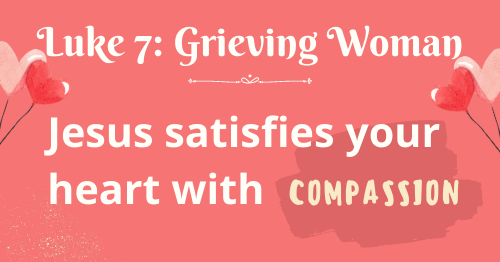Luke 7 • Grieving Woman, Jesus satisfies your heart with COMPASSION

AI was not used to generate this post.
What hurts do you have today? Did you know that when you are in pain, God’s heart goes out to you? He feels your pain. He cares for you. He comforts you in your grief. He acts on your behalf. It may not be what you expect or want. It will likely be even better. In this post, we will look at how Jesus satisfies your heart with compassion. Our New Testament example is the widow of Nain from Luke chapter 7. This is post #7 in our New Testament Women series.
Key Takeaways
- God’s heart goes out to you in pain; He feels and cares for your suffering.
- Jesus exemplified compassion by actively helping those in need, like the widow in Nain.
- The story of ‘Nancy’ shows how Jesus not only noticed her grief but acted to relieve it.
- You can trust Jesus with your deepest burdens, knowing He invites you to share your heart with Him.
- A satisfied heart, feeling God’s compassion, willingly extends compassion to others.
Listen to this post as a similar podcast from our Bible Study of New Testament women: Live Out His Love:
What is compassion? Is it feeling sorry for someone? I liked this definition I read several years ago.
Compassion is understanding the troubles of others, coupled with an urgent desire to help…Compassion is a heart’s response to a person’s need combined with a helping hand that offers mercy and grace. (Carol Kent, Becoming a Woman of Influence, p. 109, 111)
Compassion is not just feeling. It is doing something to ease someone’s pain, whether it’s for this week or more. Compassion is proactive. Every woman needs compassion from Jesus, whether she knows it or not. When do you need His compassion?
Jesus embodied God’s compassion.
Jesus embodied God’s compassion to those He met. The gospels record many incidents of Jesus expressing compassion towards people. Let’s look at just a few of them.
When Jesus landed and saw a large crowd, he had compassion on them, because they were like sheep without a shepherd. So he began teaching them many things. (Mark 6:34)
When Jesus landed and saw a large crowd, he had compassion on them and healed their sick. (Matthew 14:14)
Jesus called his disciples to him and said, “I have compassion for these people; they have already been with me three days and have nothing to eat. I do not want to send them away hungry, or they may collapse on the way.” … Then he took the seven loaves and the fish, and when he had given thanks, he broke them and gave them to the disciples, and they in turn to the people. They all ate and were satisfied. (Matthew 15:32-37)
Jesus had compassion on the crowds of people. He expressed that compassion by teaching them truth, healing their sick, and feeding them until they were satisfied. In all of those ways, He demonstrated God’s compassion for people.
Let’s look at the life of one grieving woman who certainly needed the compassion of Jesus. We meet this sorrowful woman in Luke 7. We don’t know her name. But I like to call her ‘Nancy’ to make her seem more like a real person, not just words on a page. One day, I’ll meet her in heaven and find out her real name. So when you read ‘Nancy’ in this post, I am talking about the grieving woman whose story is in Luke 7.
‘Nancy’s’ story
One day, Jesus and His disciples approached a village called Nain, about 10 miles southeast of Jesus’ hometown of Nazareth. It was there He met ‘Nancy.’
Jesus saw ‘Nancy.’
Soon afterward, Jesus went to a town called Nain, and his disciples and a large crowd went along with him. As he approached the town gate, a dead person was being carried out—the only son of his mother, and she was a widow. And a large crowd from the town was with her. (Luke 7:11-12)
As He entered Nain, a funeral procession for a “young man” (18-30 years old) was leaving town. Funerals were often held the same day as the death because of the heat and lack of embalming. The body was wrapped in cloth and carried on a stretcher. After the funeral, mourning continued for 30 days.
In the Jewish culture, having a son ensured that the family wealth and name would continue to the next generation. It would also be his responsibility to care for his aging parents, and especially for his mother if widowed. “Nancy’ already experienced the loss of her husband and now the loss of her only son.
If you have experienced the pain of someone very close to you, you probably understand the widow’s state of mind when she encountered Jesus. If you put yourself in the woman’s place, you can probably imagine what she could have been feeling and thinking. Her grief was very real. The loss of a son in the Jewish culture was a great tragedy. And she would not get any help from the religious leaders of her day. Yet, her community surrounded her. The size of the crowd showed the real sympathy of the town for her.
Jesus acted to meet her need
When the Lord saw her, his heart went out to her and he said, “Don’t cry.” Then he went up and touched the bier they were carrying him on, and the bearers stood still. He said, “Young man, I say to you, get up!” The dead man sat up and began to talk, and Jesus gave him back to his mother. They were all filled with awe and praised God. “A great prophet has appeared among us,” they said. “God has come to help his people.” This news about Jesus spread throughout Judea and the surrounding country. (Luke 7:13-17 NIV)
When Jesus entered Nain, He saw a woman who was obviously a widow walking next to her dead son on a bier (a stretcher). He knew this was her only son. He knew and understood her deep hurt and fear about what would happen to her. His heart went out to her, which literally means He had compassion on her. When Jesus told her not to cry, He wasn’t being mean or saying that crying is wrong. He was telling her she could stop crying because He was going to heal her hurt. Jesus had compassion on her and took action to relieve the suffering. He brought her son back to life. The onlookers were amazed, began praising God, and spread the news to others from their region.
We are not told why Jesus went to Nain, but the timing of His approach with the funeral procession would seem to be a God-arranged “divine appointment.” Jesus gave three gifts that day—life to the son, the son to the mother, and hope to both plus the town. When Jesus said goodbye to ‘Nancy,’ He left a woman who no doubt felt satisfied by His love and compassion for her. And this ended up touching many lives.
Jesus could have just passed by and assumed the town would meet ‘Nancy’s’ basic needs of food and shelter. But He didn’t. He knew and felt Nancy’s deep hurt and fear about what would happen to her. He acted with compassion on her behalf and gave her son back to her.
As Psalm 103 promises,
Praise the Lord, my soul, and forget not all his benefits—who forgives all your sins and heals all your diseases, who redeems your life from the pit and crowns you with love and compassion, who satisfies your desires with good things so that your youth is renewed like the eagle’s. (Psalm 103:2-5)
Nancy was crowned with love and compassion. To be crowned with compassion means to be surrounded with it so that you have a sense of God’s favor and protection. Nancy surely must have felt God’s favor and protection that day. Others did, too, because they shared the good news for miles around, praising God for His favor.
God’s compassion for you
Isn’t it comforting to know that when you are in pain, God’s heart goes out to you? He feels your pain. He cares for you. He comforts you in your grief. He acts on your behalf. It may not be what you expect or want. It will be even better. He is not a cold, distant, helpless Deity but is a loving, compassionate God.
Jesus personally invites you to bring your deepest longings, heartaches, and anxieties to Him today, just as men and women did in the ancient past. Are you confident that you can go to Him and openly express your deepest needs? Often, Jesus responds by giving you a Bible verse to grasp. Or He sends someone to alleviate your suffering through bringing a meal, visiting, calling, providing clothes, or just listening and giving counsel and prayer. Have you experienced that?
When it comes to someone who is grieving over the death of a loved one, we often don’t know what to say. I have a list of things not to say, such as “You can have another child” or “She’s in a better place.” Those hurt more than help. You can look online for a list of what not to say. It’s also wise not to give faulty comfort pointing to other things like angels and signs rather than Christ.
One of the nicest things someone wrote to me in a card after my father died several years ago was this, “Knowing you, I look forward to meeting your dad in Heaven one day.” I cherish that card. That was a compassionate response from a Christian sister.
Jesus’ heart went out to this grieving widow I call ‘Nancy.’ Isn’t it comforting to know that when you are in pain, God’s heart goes out to you? He feels your pain. He cares for you. He comforts you. He acts on your behalf. He is not a cold, distant, helpless Deity but is a loving, compassionate God. Jesus personally invites you to bring your deepest longings, heartaches, and anxieties to Him today, just as men and women did in the ancient past. He wants to satisfy your heart needs.
What hurts do you have today? Talk to Jesus and tell Him about your hurts, knowing He has compassion for you. Trust Him to work in your life to bring you healing, hope, and freedom.
Jesus satisfies your heart with compassion when you need it. As the Bible promises,
He satisfies the thirsty and fills the hungry with good things. (Psalm 107:9)
A satisfied heart senses God’s favor and compassion and willingly extends compassion to others from a grateful and joyful heart.
Read all the articles in our New Testament Women series.
All of the above information is covered in the Live Out His Love Bible Study and the short and easy Satisfied by His Love Bible Study covering the lives of women in the New Testament.
-
Live Out His Love (NT Women)—paperback
$16.00 -
Live Out His Love (NT Women)—printable / fillable
$10.00 -
Live Out His Love (NT Women)—digital reader version
$4.99 -
Satisfied by His Love (8 NT Women)—paperback
$14.00 -
Satisfied by His Love (8 NT Women)—printable / fillable
$10.00 -
Satisfied by His Love (8 NT Women)—digital reader version
$4.99
Image credit: sourced from a template at canva.com
AI was not used to generate this post.





